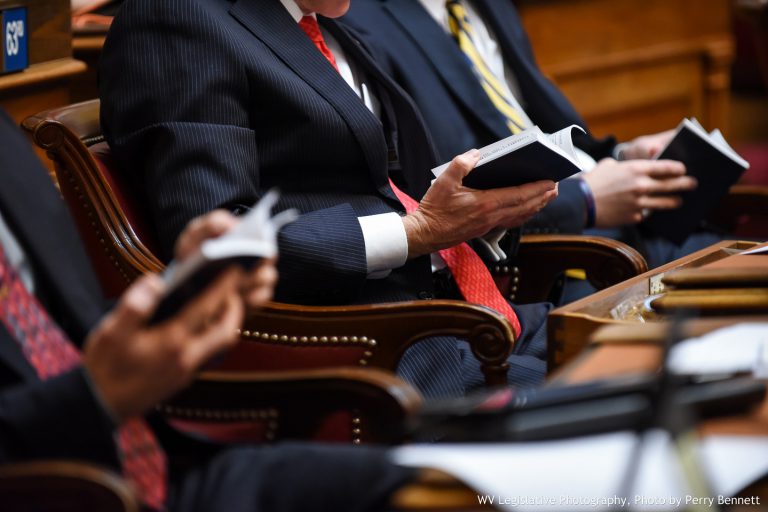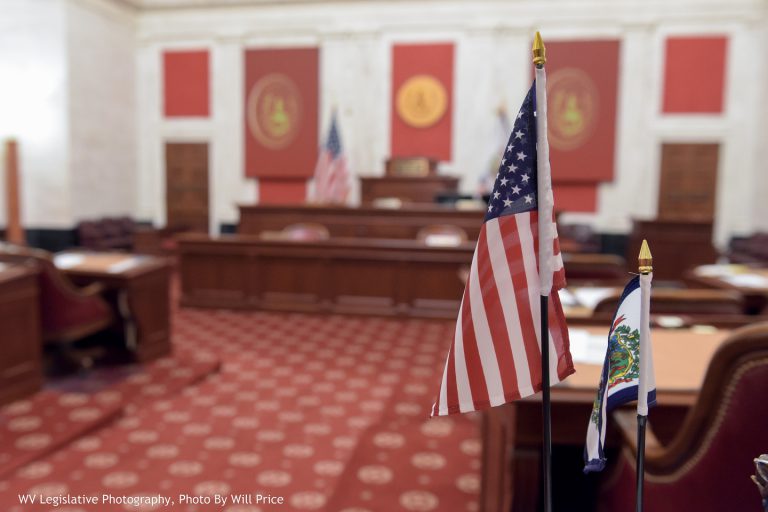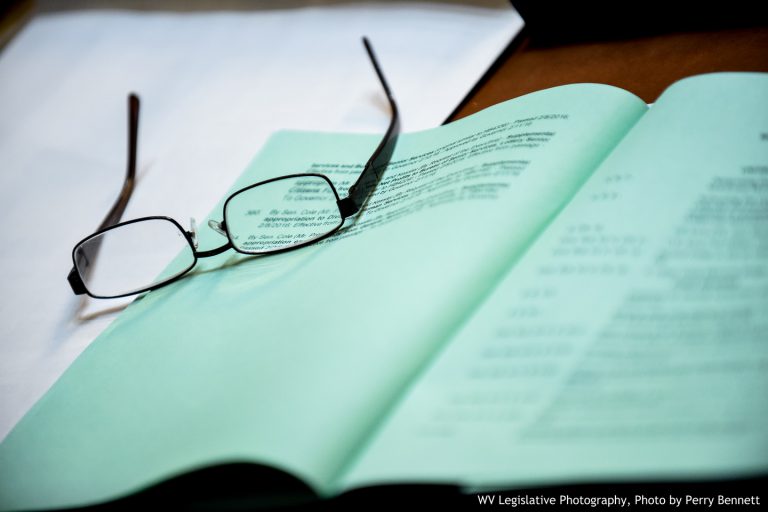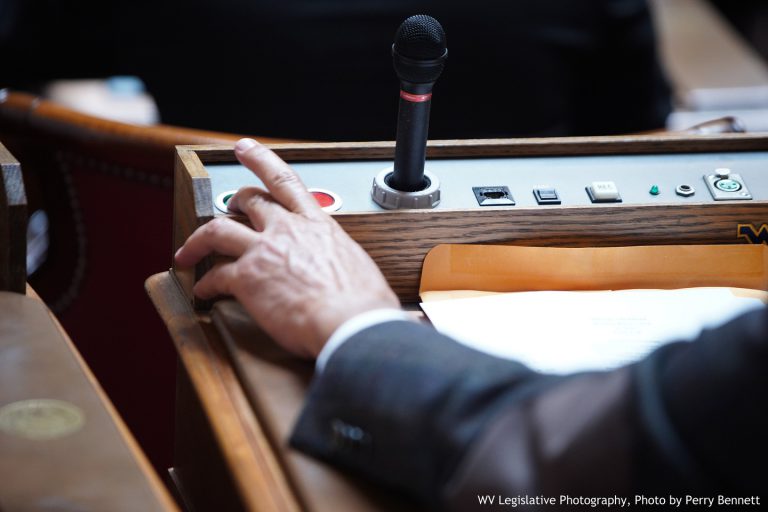In the House
As of 4 p.m. Feb. 18, 2004, the 36th day of the Regular Legislative Session, 1,154 bills have been introduced in the House of Delegates. Of these, the following 21 bills have passed in the House since Feb.11 and were sent to the Senate for its consideration.
Committee Substitute for House Bill 2200 would make the destruction of property a felony offense. Under this bill, the penalty for taking, defacing or destroying property would be a misdemeanor and punishable by a fine of no more than $500 or jail time of no more than one year. Taking, defacing or destroying property worth more than $2,500 or more would be a felony, with a fine of no more than $2,500 or jail time of one to 10 years. Taking, defacing or destroying property that designates boundaries would be a misdemeanor with a fine of $20 to $200 or one to six months in jail.
Committee Substitute for House Bill 2914 relates to the rehabilitation and liquidation of insurers under the jurisdiction of the West Virginia Insurance Commissioner. This bill would modify current state law relative to liquidation proceedings to create conformity with a recent federal case law.
Committee Substitute for House Bill 4001 would ensure safer schools and empower teachers by automating student suspension and expulsion data. The bill also includes provisions that would refocus school and county improvement plans, revise school performance measures, and specify a salary cap of $107, 250 for the director of the Office of Education Performance Audits. Under this bill, the State Board of Education would establish early detection and intervention programs to assist underachieving schools and school systems.
House Bill 4134 would replace the Secretary of the Department of Commerce, Labor and Environmental Services with the Governor’s Chief Technology Officer as a member of the Employee Suggestion Award Board. The bill also would increase membership in the program by one senator and one delegate.
Committee Substitute for House Bill 4143 would create a West Virginia Center for Nursing to establish a statewide strategic plan addressing the nursing shortage in the state. Starting July 1, 2004, the West Virginia Nursing Shortage Study Commission would be dissolved and its powers and responsibilities would be transferred to the West Virginia Center for Nursing. The center would facilitate the recruitment and retention of nurses.
House Bill 4160 would require anyone working in a health care-related field to report to Adult Protective Services any suspected abuse or neglect of an incapacitated adult or faculty resident. The bill also would require Protective Services to interview the victim within 72 hours of receiving the report.
Committee Substitute for House Bill 4250 would prohibit anonymous complaints against court appointed psychologists or psychiatrists relating to a child custody evaluation. If the complaint relates to a child custody proceeding, the claimant would be responsible for all related fees if the psychologist or psychiatrist is not held liable. If the licensed psychologist or psychiatrist is found liable, then the psychologist or psychiatrist is responsible for fees for the claimant.
Committee Substitute for House Bill 4266 would require some regulatory agencies to study ways to expedite the issuance of licenses, permits and certifications. Agencies which would be included are the Division of Labor, the Office of Miners Health, Safety and Training, the Division of Forestry, the Office of Health Facilities Licensure and Certification within the Department of Health and Human Resources, and the Department of Environmental Protection, except for the Oil and Gas Inspectors Examining Board.
Committee Substitute for House Bill 4273 would transfer the authority to appoint guardians of minors from the County Commission to the Family Court.
Committee Substitute for House Bill 4282 would authorize crossbow hunting for disabled persons. The bill also would include provisions prohibiting shooting at any wild animal unless it is plainly visible; and, the use of using artificial light to hunt, locate, attract, or trap these animals. Also, the bill would prohibit any person from having a bow and a gun together when hunting in the fields or woods of West Virginia.
Committee Substitute for House Bill 4338 would provide for the issuance of special registration plates promoting education and allow the use of the special fee for the registration plates to fund transportation for school trips.
Committee Substitute for House Bill 4373 would make it a crime to alter a traffic-control device with an infrared or electronic device. Using these devices would be a misdemeanor offense punishable by a fine of no more than $500 and/or jail time of up to six days.
House Bill 4451 relates to the West Virginia Capital Company Act, and would clarify that the Economic Development Authority and Tax Commissioner would be authorized to require certain examination and compliance actions. This bill would require each capital company to be audited annually.
House Bill 4478 would lengthen the time period that county boards are required to publish a year-end financial statement from 60 days to 90 days. The reports would include the receipts and expenditures during the previous fiscal year; the name of each firm, corporation, and person who received more than $250 during that year; and, all debts and information regarding the debts.
Sunset legislation:
House Bill 4418 would continue the Board of Architects until July 1, 2014. House Bill 4419 would continue the Board of Landscape Architects until July 1, 2009.
House Bill 4479 would continue the Department of Health and Human Resources until July 1, 2005. House Bill 4480 would continue West Virginia’s participation in the Interstate Commission on the Potomac River Basin until July 1, 2010.
Completed Legislation
Of the six bills that have been sent to the Governor, the following two completed legislative action since February 12th:
Committee Substitute for Senate Bill 251 will provide requirements and limitations for mandatory nurse overtime in hospitals. The bill will allow nurses to work overtime for the completion of a single patient procedure, or during a natural disaster, an outbreak of disease or under similar emergent circumstances. Nurse anesthetists and any nurse consenting to work additional hours will not be impacted by this legislation. The House amended the bill by specifying that any fines imposed on violating hospitals will be directed to the Health Care Authority.
House Bill 4020 will protect personal information maintained by state agencies within the legislative, executive and judicial branches of state government from inappropriate disclosure. The personal information protected under this legislation includes an individual’s home address, social security number, credit/ debit card numbers, driver’s license identification number, marital status and maiden name.
In the Senate
As of 4 p.m., Wednesday, February 18th, 2004, the 36th day of the 2004 Regular Session, 561 bills have been introduced in and 47 Senate Bills have been passed by the Senate. Of those, the following 12 bills have been passed by this body since February 12th and are currently under consideration in the House of Delegates:
Committee Substitute for Senate Bill 71 relates to verifying the legal employment status of state workers. Within the legislative findings of this measure, it is stated that employers have the responsibility to verify the legal status of all employed individuals and report their employment to the appropriate governmental agencies. The purpose of this legislation is to make technical corrections to bring current state law into conformity with federal law.
Committee Substitute for Senate Bill 125 would permit the solicitation of certain state employees for contributions to campaigns for or against ballot issues in county or local elections. The bill also amends current law by removing the cap on campaign contributions in national elections.
Committee Substitute for Senate Bill 240 would provide that a governing body with seven or less members would not be required to have a second to any motion presented to the board unless the governing body adopts procedural rules requiring them.
Committee Substitute for Senate Bill 261 would allow for a supplemental assessment by an assessor of personal property when this property has been removed from the record books.
Committee Substitute for Senate Bill 271 would require racial profiling data be collected by law-enforcement officers and agencies each time a motorist is stopped for an alleged violation of the law. Among other information, a law-enforcement officer would report the identifying characteristics of the driver; the location and duration of the stop; and, if a warning or citation was issued.
Senate Bill 276 would establish a marriage license discount for applicants who complete approved premarital counseling. This discount would be enacted for those couples completing courses consisting of at least four hours of instruction regarding conflict management, communication skills, financial responsibilities and parenting responsibilities.
Committee Substitute for Senate Bill 425 would designate English as the official language of West Virginia. Upon passage of this bill, no state agency or political subdivision would be required to provide or prohibited from providing foreign language versions of any written materials.
Senate Bill 479 relates to the licensing of foreign insurers. Under this legislation, a foreign insurer licensed to operate in this state would be permitted to conduct insurance business in West Virginia without securing the certificate of authority from the Secretary of State. Senate Bill 501 would add the West Virginia State Police, the Teachers’ Defined Contribution and the Deputy Sheriff retirement systems to the definition of “retirement plan” pertaining to benefit disqualification because of less than honorable service. In addition, the bill also extends the time frame for a termination of benefits notice from one to two years following a conviction.
Senate Bill 509 would permit the person or persons who owned property sold at a sheriff’s sale to receive any surplus from the sale upon filing a proper claim.
Senate Bill 524 relates to the Council for Community and Technical College Education and the PROMISE Scholarship Board of Control. Under this legislation, the process of appointing members to these boards would be brought into conformity with a recent West Virginia Supreme Court ruling.
Senate Bill 526 would make supplemental appropriation of public moneys from an unappropriated surplus balance in the general revenue to the Division of Rehabilitation Services for Fiscal Year 2004.
Future leaders flourish in Legislature’s internship programs
Some of the greatest legislative leaders of the past are honored and remembered each session through the West Virginia Legislature’s Internship Programs. These programs provide a great experience for tomorrow’s best and brightest future leaders. The Legislative Internship Programs employ more than 70 full-time college students who meet a number of qualifications, including good academic standing, from West Virginia’s public and private colleges and universities. The length of these internships range from a week to an entire year, allowing students to gain a valuable educational experience. These students have the opportunity to work one on one with many state leaders while learning the intricacies of the legislative process. The newest addition to the legislative internship program is the McManus Fellowship. Lewis McManus had a compelling career in the Legislature as a Delegate and also as Speaker of the House for multiple terms. He was known for his honesty and courtesy. The West Virginia Legislature remembers his accomplishments and honors him with the foundation of this internship program. The McManus Fellowship will be offered each year to one second-year graduate student who is obtaining a master’s degree in public administration through West Virginia University or Marshall University. The student serves as an intern for one academic year, including regular session and monthly interim meetings. The internship provides the student with one year’s tuition and fees at his or her university. Walter Rollins served the state for more than 20 years as a member of the Legislature. He was a master of parliamentary procedure and was a man with great attention to detail. He was known to read every piece of legislation word for word that was generated each session. He also was known for his strong personality as a great negotiator and a grandfather figure around the statehouse.
The Walter Rollins Scholars Program selects two graduate students to study and work with those officials of the Senate and House of Delegates in the highest positions of leadership. These scholars do independent research within or about the legislative process while assisting leaders with decision making preparations during the session. Robert W. Burk, Jr. was elected at the age of 26 and served for over 13 years in the West Virginia Legislature. Throughout his career he was known as a gentleman willing to work with anyone on any issue regardless of political party affiliation. He was considerate, respectful and considered a true statesman. The Robert W. Burk, Jr. Student Intern Program selects up to four graduate students for placement in the offices of committee chairpersons and other legislative leaders in both bodies. Burk interns have an opportunity to observe the making of policy, analyzing policy and conducting research on issues throughout this internship. Judith A. Herndon, in her 10 years of legislative service, was a leader for tax reform, sunset legislation, and for reduction in the powers of governmental agencies. She was the first female member of the Senate Committee on Rules and was known as a of reason and moderation. The Herndon Interns, who must hold undergraduate standing while having completed 60 hours in any collegiate major, are selected to fill 10 positions. They also must have completed at least one course in political science or public affairs. Herndons are assigned to assist a sole legislator from the Senate or the House of Delegates and perform various research and bill drafting duties, while developing an understanding of the politics of legislation.
Carl M. Frasure served West Virginia University, the state and the nation for more than four decades. He was a life long teacher and an involved citizen in community, state and national service. Julius W. Singleton was a legislator who always was informed and had a keen knowledge of the legislative process. He was elected Speaker of the House and to this day is recalled as one of the greatest Speakers the state has ever seen. He served the public and the members with patience and loyalty. The Frasure-Singleton Internship Program provides full-time undergraduate students an opportunity to observe the state legislative process for one week during the fourth and fifth full weeks of the regular session. Fifty students are selected from 31 public and private institutions of higher education around the state. The program provides an overall view of the legislative process, including both committee and floor activity and an opportunity for legislators to educate the participants on the legislative process. The Legislature’s Reference and Information Center provides an internship for four students majoring in the field of journalism at West Virginia University and Marshall University,
the only two accredited journalism schools in the state. The selected participants work with members of both the Senate and the House of Delegates throughout the session and are assigned to cover floor sessions as well as all aspects of the legislative process, including committee meetings, public hearings and press conferences. They also work on the publication of a weekly newsletter, write news releases and respond to media and citizen requests. The distinguished lawmakers who have been honored through the Legislature’s Intern Programs will be remembered for the contribution to not only the institution they served, but also for their service to all citizens of West Virginia. Through these programs, interns are provided with opportunities that few have had the chance to experience. The students walk away with the unique insight and knowledge of West Virginia’s State Legislature and its functions.
In the House
As of 4 p.m., Wednesday, February 11th, 2004, the 29th Day of the 2004 Regular Legislative Session, 1,043 bills have been introduced in the House of Delegates. Of those, 21 measures have been passed by the House since Feb. 5 and were sent to the State Senate for further consideration.
Committee Substitute for House Bill 3083 would allow magistrate court to be held in various locations throughout the state temporarily if the magistrate determines it is in the best interest of the public to do so; it would be cost effective; and, the interests of justices would be served.
House Bill 3097 would allow for all civil actions concerning West Virginia University to take place in Monongalia County and all actions regarding Marshall University to take place in Cabell County, rather than Kanawha County where they currently take place.
House Bill 3150 would prohibit state entities from requiring that any performance, payment, or surety bond required or permitted by this section be obtained from any particular surety company, agent, broker, or producer. This includes state officers, employees of any public agency, public authority, public corporation, or other public entity, including county commissions and municipalities.
House Bill 4011 would give terms found in the West Virginia Personal Income Tax statutes the same meaning as those found in Federal Income Tax statutes.
House Bill 4012 would give terms found in the West Virginia Corporation Net Income Tax statutes the same meaning as those found in Federal Income Tax statutes.
Committee Substitute for House Bill 4086 would include veterans from the Gulf War and Afghanistan conflicts on the Veterans’ Council.
House Bill 4259 would increase the cost of rabies vaccinations for the states’s dogs and cats at a clinic established by the County Commission from four dollars to eight dollars.
House Bill 4138 would prohibit someone from falsely representing himself as a public official or employee by copying or imitating markings of an official vehicle on his or her motor vehicle. This measure would charge a first time offender with a misdemeanor resulting in possibly one year in jail and/or a $1,000 fine. For a second offense, the individual would receive a felony charge and confined to a penitentiary for one to 10 years and/or fined $2,000.
House Bill 4140 would require that the Ethics Commission establish a code of conduct for state administrative law judges. Provisions in the code would include that state administrative law judges uphold integrity and independence of the administrative judiciary; avoid impropriety in all activities; and refrain from political activity inappropriate to the office.
House Bill 4142 would require County Clerks to create and post a disclaimer in their offices advising that certain restrictive agreements based on race, color, religion, ancestry, sex, familial status, blindness, handicap or national origin are invalid and unenforceable.
House Bill 4144 would allow secretaries to set appointments for agents. Currently, secretaries are not allowed to establish the agent’s appointments. The legislation states this prohibition is costly, time consuming and counterproductive to the agent’s management of time.
House Bill 4148 would allow bail bondsmen to deliver offenders to county or regional jails without the appropriate papers, if they are unable to access the Circuit Clerk’s Office. Under this bill, the bondsman is required to claim the bailpiece from the Clerk by the next judicial day or face misdemeanor charges.
House Bill 4259 would revise the current composition, powers and duties of the Governor’s Cabinet on Children and Families. The Cabinet would, among other duties, oversee technical assistance and appropriate money that may be available for family resource networks. It also would evaluate early parent education programs and other community based initiatives. In addition, the Cabinet would be responsible for setting targets and exploring new strategies for improving the lives of children and families in the state.
House Bill 4287 would eliminate the limitation on seniority rights and the requirement that funding be derived from the institution’s existing budget as in exisitng law. Currently, the law provides for payment of an annual salary increment for higher education classified staff be paid from the existing budget of the colleges and universities. If funding the increments results in employee layoffs, then the layoffs may occur without regard to seniority of the employees. This measure would prevent these actions.
House Bill 4290 would create a framework that would prevent policies and practices from distracting attention and resources from the Legislature’s ability to provide an efficient system of education.
House Bill 4348 would provide $4.4 million from the Unclaimed Property Trust Fund to the Banking Services Fund, both of which are located in the Treasurer’s Office. The revenues to the Banking Services Fund have decreased over the past few years due to the decrease in interest rates, making the $4.4 million a necessity to meet obligations funded from the unclaimed property account.
House Bill 4349 would make technical corrections to sales tax law and update it as it relates to the Streamlined Sales and Use Tax Agreement among the states.
House Bill 4248 would continue the Office of the Environmental Advocate until July 1, 2007. House Bill 4304 would continue the Children’s Health Insurance Board until July 1, 2007.
House Bill 4350 would continue the West Virginia State Police until July 1, 2005.
House Bill 4351 would continue the Waste Tire Remediation Program until July 1, 2006.
In the Senate
As of 4 p.m. Wednesday, February 11, 2004, the 29th Day of the 2004 Regular Legislative Session, 512 bills have been introduced in the Senate. Of those, 16 measures were passed since Feb. 5 and will go on to the House for its consideration.
Committee Substitute for Senate Bill 52 would allow an owner of a vehicle with a Class G registration to have a motorcycle registration plate fastened in a vertical position. The owner would have to pay a onetime fee of $25 to cover the additional cost and services necessary to issue the special registration plate.
Senate Bill 138 would protect personal information maintained by the state from inappropriate disclosure. This information would include an individual’s home address, social security number, credit or debit card number, driver’s license identification number, marital status, or maiden name.
Senate Bill 181 would permit medically discharged or retired State Police to carry a concealed weapon for life without a license. Upon receiving the weapon, a written consent by the State Police Superintendent would be required and would have to be with the member at all times when he or she has the weapon in possession. No member, however, not working due to a mental disability, would be eligible for this consent.
Senate Bill 208 would allow State Police to engage in certain political activities while off duty and out of uniform. These activities would include to campaign for and hold office in political clubs and organizations, to actively campaign for candidates for public office in partisan and nonpartisan elections, and to contribute money to political organizations and attend political fund-raising functions.
Senate Bill 231 would authorize County Commissioners to establish a flood plain or mudslide enforcement agency. This agency would require and issue permits for all proposed construction, development, and other improvements in the county and conduct inspections of the projects as well.
Committee Substitute for Senate Bill 251 would provide requirements and limitations for mandatory nurse overtime in hospitals. According to this measure, any nurse who works 12 or more consecutive hours in a shift would be allowed at least eight hours off-duty time immediately following the completion of the shift. No nurse shall work more than 16 hours in a 24-hour period.
Senate Bill 318 would give the opportunity for inmates of correctional institutions to earn days labeled as “good time” for good conduct. Each day of good conduct would be taken off of the individuals sentence only after the inmate has served at least half of his or her overall sentence. No inmate, however, sentenced to serve life in prison, would be eligible to earn any “good time.”
Senate Bill 319 relates to centers for housing young adult offenders. According to this bill, if the offender, in the opinion of the warden, proves to be an unfit person to remain in the center, the offender would be granted a hearing before a committee court to review the warden’s determination before dismissal from the housing center.
Senate Bill 404 would provide a clarifying definition of the term “behavioral health services” excluding the description of “community care services.” Behavioral health services would mean services provided for the care and treatment of persons with mental illness, mental retardation, developmental disabilities or alcohol or drug abuse in an inpatient, residential or outpatient setting.
Senate Bill 406 would allow the Commissioner of Corrections, regional jail supervisors, or city or sheriff operating a jail the choice of a telephone call or written notification of a defendent’s last known address or telephone number upon his or her release.
Senate Bill 428 would provide a definition for “transacting insurance” throughout the insurance code and relates to the transactions of an insurance business in West Virginia.
Senate Bill 448 relates to higher education advisory boards. According to this bill, each president or administrative head of an administratively linked community and technical college would consult with classified council during the month of April to elect one new member of the council.
Senate Bill 449 relates to elections generally. This bill would provide that the filing fee for any candidate for president or vice president of the United States would not exceed $2,500 starting with the 2004 filing period.
Senate Bills 469 would continue the Interstate Commission on Uniform State Laws.
Senate Bill 470 would continue the Real Estate Appraiser Licensing and Certification Board. Senate Bill 471 would continue the State Board Risk and Insurance Management.
“Doc of the Day” program provides valuable service
During each legislative session, the number of people who fill the State Capitol multiplies – lawmakers, per diem staff, lobbyists and citizens circulate throughout the statehouse as the Legislature conducts its business. With this heightened traffic, the Doctor of the Day program provides many beneficial services to individuals who may experience unforeseen medical circumstances. This year marked the 15th anniversary of the start of the Doc of Day Program and both the Senate and House of Delegates recognized the importance of the program. The Senate adopted Senate Resolution 5 on Jan. 23, 2004, acknowledging the dedicated service of West Virginia’s Academy of Family Physicians to the Legislature. On the same day, the House of Delegates issued a citation to the Academy recognizing its service. Senate President Earl Ray Tomblin said the doctors who participate in the program provide quality medical care to people in the Capitol. “We have thousands of visitors at the Capitol during the legislative sessions in addition to all of our legislators and staff, and I have seen the family doctors providing excellent medical care,” he said. House Speaker Bob Kiss recognized how busy members and staff are during the session and that they might not have time to see their own doctors. Kiss said the program is important to the to the heath care of those involved with the legislature and “provides a valuable resource for medical information to our members.” The West Virginia Academy of Family Physicians sponsors the program and has provided a volunteer family physician every day of the legislative session since the program was implemented in 1989. Doctors from all over the state, including family practice residents from West Virginia and Marshall Universitys’ medical schools, participate in the program. Over the years, the program has provided more than 20,000 patients with emergency medical treatment. Patients have included legislators, staff, government officials and the
general public visiting the Capitol. The doctors have treated whatever ails people in the Capitol, including everything from headaches to heart attacks. Also, the services provided may eliminate numerous trips to health care facilities outside the Capitol for those who receive regular or routine procedures. During the limited number of days in the session, lawmakers and staff save lost time from the workplace. Doctors are assisted by the Capitol’s full-time RN Marsha Francis. Affectionately referred to as “Nurse Marsha,” Ms. Francis mans the Capitol Dispensary and assists the visiting physicians. Should an emergency occur, Ms. Francis has access to a variety of medical equipment on the Capitol campus including four Automated External Defibrillators (AED), oxygen and other medical apparatus. The Dispensary serves as a triage facility and handles everything from basic procedures to major trauma and has the capabilities to sustain an injury until the patient can be transferred to a medical facility. With nearly 14 years of Capitol nursing experience, on top of 30 years of hospital service, including a three-year stint in the OR (operating room), Ms. Francis is a graduate of West Virginia Univerity Institute of Technology’s first nursing program. “I appreciate the Doctor of the Day Program during the 60-day Legislative Session,” Francis said. “I learn a lot from them and I hope they learn a lot from me.” The program was the first of its kind in the country and has been a model for other state legislatures including Oregon, Kansas, Florida, and Michigan.
In the House
As of 4 p.m., Wednesday, February 4th, 2004, the 22nd day of the 2004 Regular Legislative Session, 928 bills have been introduced in the House of Delegates. Of those, 34 measures have been passed by the House and are under consideration in the State Senate.
House Bill 4017 would prohibit the use of gambling names and symbols in advertising, signs and directions to the establishments of those who are licensed to operate video lottery machines. The measure states that a limited video lottery retailer would not be allowed to display a name for their establishment on the outside of the establishment unless the name has been approved, in writing, by the West Virginia Lottery Commission.
House Bill 4020 would protect individuals’ and their dependants’ personal information from inappropriate release. The bill states that any personal information maintained by state entities, unless essential to the function of that entity, would be exempt from disclosure.
House Bill 4021 would prevent the disclosure of a state employee’s and state officer’s personal information. The measure would provide that any personal information maintained by state agencies or entities with respect to state employees and officers, and their dependants, as well as retirees of any system administered by the Consolidated Public Retirement Board, is exempt from disclosure.
House Bill 4037 would provide for safe schools through alternative education programs, as well as provide public school officials with certain juvenile justice records. The measure would allow for disclosure of juvenile justice records if the youth has been charged with certain offenses, such as violence against others, possession of a deadly weapon and possession or delivery of a controlled substance.
House Bill 4055 would create a compact between states for the protection and return of juvenile offenders, runaways and/or other youth. The bill would authorize the Governor of West Virginia to enter an interstate agreement with other states to ensure that any juvenile, adjudicated or not, be protected while in custody and safely returned. The measure also would establish the Interstate Commission on Juveniles to collect data regarding the movement of juveniles between states and oversee the details contained in the interstate compact.
Committee Substitute for House Bill 4085 would clarify certain terms related to the Ron Yost Personal Assistance Services Act. the Ron Yost Personal Assistance Services Act (RYPAS), established in 1999, is a consumer controlled program to enable individuals with severe disabilities to live in their own homes and communities. Provisions of this bill would clarify eligibility requirements and funding sources for the program.
House Bill 4097 would identify those persons or entities responsible for paying certain fees assessed by circuit court clerks with regard to the processing of criminal bonds and bailpieces. This measure would set the fees for certain bonds and bailpieces depending on the type of bond established.
House Bill 4101 would allow an employee to use scanner technology to verify the age of a customer purchasing alcoholic beverages to use the proof of the scan as his/her defense of the sale should the purchaser prove to be under the age of 21. The bill states that any licensee, agent or employee, with the absence of fraud or bad faith, who used scanner technology to certify the age of an individual purchasing beer or alcoholic beverages, would be able to use such technology to defend the sale.
House Bill 4104 would make it a felony for the use of a scanning device or a re-encoder to commit fraudulent activities. This bill would prohibit the use of a re-encoder for the purpose of placing information from a magnetic strip of one payment card to another without the permission of the authorized user.
House Bill 4108 would exempt K-9 law enforcement and other emergency vehicles that haul animals from window-tinting requirements. The vehicles would be authorized to have sun-screening devices and darker window tinting to provide greater comfort for the animals and make them less visible from public view.
House Bill 4110 would conform the state’s criminal and penalty laws with federal law regarding the use and display of beer and alcoholic beverages in motor vehicles. The bill would provide certain regulations regarding alcohol use in public places, including highway use, and would specify vehicles in which passengers would be permitted to consume alcoholic beverages.
House Bill 4119 would allow counties that had obligated income from a hotel/motel tax to a capital project to keep the money until the obligation is paid off. Also, municipalities would be required to hold a public hearing prior to annexation, unless an election is held.
House Bill 4131 would require certain reports be made to the Legislative Oversight Commission on Workforce Investment for Economic Development. This bill would create the Workforce Initiative Program to administer and oversee grants to community and technical colleges. The program also would set criteria for grant applications, receive applications for grants, make determinations on distribution of funds, and evaluate the performance of workforce development initiatives.
House Bill 4132 relates to the West Virginia Guaranteed Work Force Program. Under this measure, the West Virginia Development Office would develop a training program to provide assistance for new or expanding businesses for training, retaining, or upgrading of the skills of potential employees. The program would emphasize training of employees specifically designed to accommodate the needs of individual employers.
House Bill 4157 would continue the Rural Health Advisory Panel. This panel is designed to increase the amount of healthcare services provided in rural areas of the state, and works in conjunction with the Rural Health Education Partnership to attract healthcare professionals to rural West Virginia.
House Bill 4248 would continue the Office of the Environmental Advocate. The Environmental Advocates Office handles requests for assistance about the public comment process, how to appeal agency decisions, and other useful resources.








